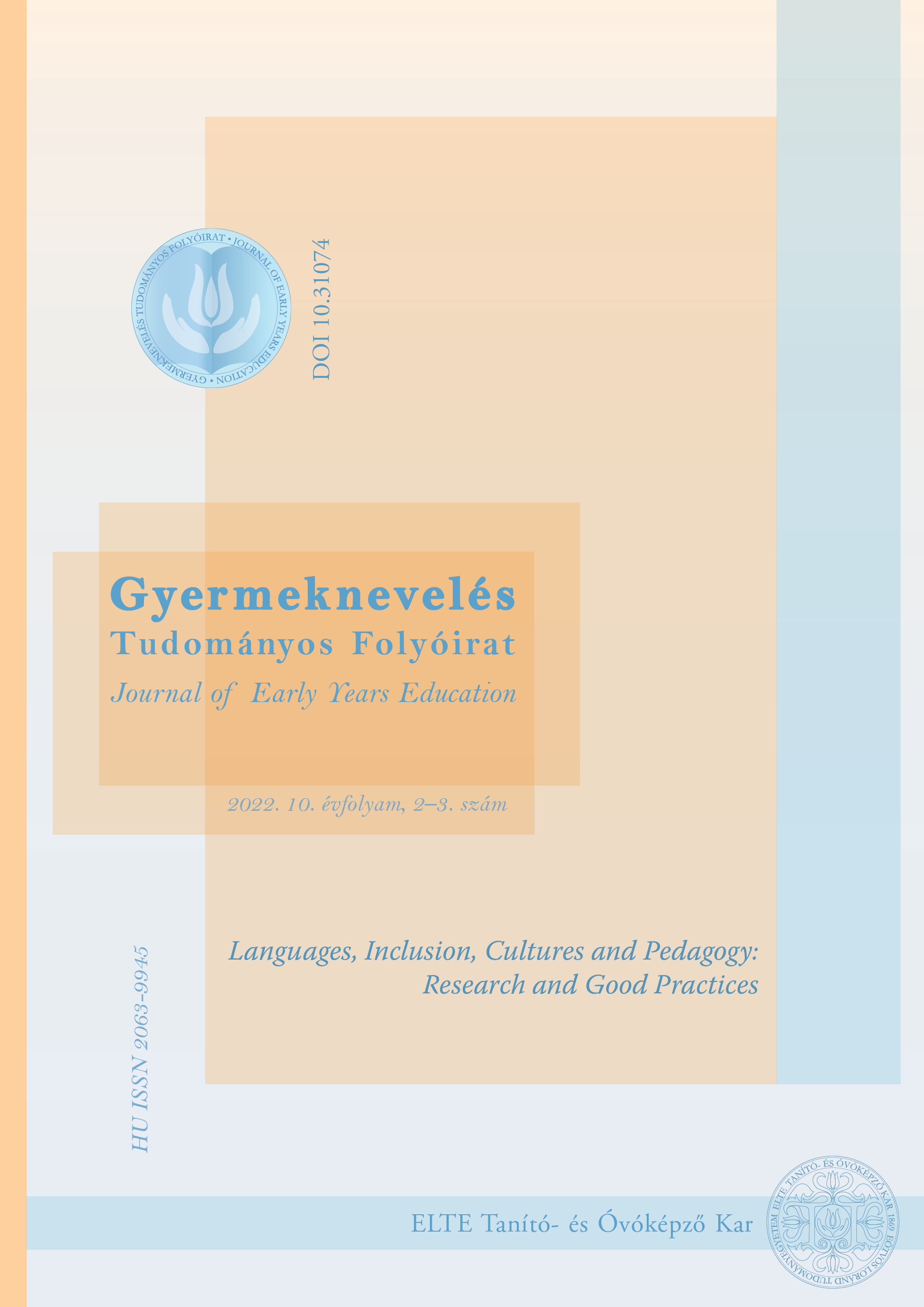How can special teachers aid successful kindergarten inclusion?
Good practices in a district of Budapest
DOI:
https://doi.org/10.31074/gyntf.2022.3.10.22Kulcsszavak:
SEN, diversity, teamwork, good practices, teacher training, resource parent groupAbsztrakt
In our study, we would like to present an institutional development that furthered collaboration between mainstream kindergarten teachers and special education teachers, as well as the creation and functioning of a broader transdisciplinary team. This good practice can support the integration of children with special educational needs into kindergarten and the well-being of those involved. This process has grown in relevancy as integrated education becomes more widespread in Hungary, affecting more than 70% of SEN children today. According to the data published by the CSO (2020) for the 2019/2020 school year, 82% of children with special educational needs in the pre-school age group and 72% of those affected in the primary school age group receive integrated education.
Letöltések
Hivatkozások
Booth, T. & Ainscow, M. (2011). Index for Inclusion: Developing learning and participation in schools, 3rd edition. Centre for Studies on Inclusive Education (CSIE).
Booth, T. & Ainscow, M. (2015). Inclusion Index, Supporting learning and participation in schools, 3rd expanded, revised edition. Educatio Social Service Nonprofit Ltd.
Faragóné Bircsák, M. & Papp, G. (2011). Az egységes gyógypedagógiai módszertani intézmény (EGYMI) feladatai a tanulásban akadályozott gyermekek, tanulók szolgálatában. In Papp, G. (Ed.), A diagnózistól a foglalkozási rehabilitációig - Új utak és eredmények a tanulásban akadályozott személyek gyógypedagógiájában (pp. 103–113). ELTE BGGYK, ELTE Eötvös Kiadó.
Flieger, P. (1997). Changes in teachers’ attitudes towards integrated education – Methodological considerations for teacher training. In Zászkaliczky, P., Lechta, V. & Matuska, O. (Eds.), A gyógypedagógia új útjai - Rendszerfejlesztés, tanácsadás, integráció. Nové cesty k postihnutỳm ľudom. Rozvoj systému, poradenstva a integrácie (pp. 217–227). Vydavateľstvo Liečreh Gúth.
Five Key Messages for Inclusive Education (2014). Putting theory into practice European Agency for Special Needs and Inclusive Education. https://www.europeanagency.org/sites/default/files/IC%20Researchers%20paper.pdf
Kereki, J. & Szvatkó, A. (2015). A koragyermekkori intervenció, valamint a gyógy-pedagógiai tanácsadás, korai fejlesztés, oktatás és gondozás szakszolgálati protokollja. Educatio Társadalmi Szolgáltató Nonprofit Kft.
Kollár, J. (2016). Communication within the health care team: doctors and professionals. Medical Weekly, 157(17), 659–663. https://doi.org/10.1556/650.2016.30444
Kullmann, L. (2015). The possibilities of teamwork preparation in teacher education. Special Education Review, 43(3), 178–192. http://epa.oszk.hu/03000/03047/00069/pdf/EPA03047_gyosze_2015_3_178-192.pdf
Kőpatakiné, M. M. (2004).. Új szakmai igények, új működési forma: egységes gyógypeda-gógiai módszertani intézmények. Országos Oktatási Integrációs Hálózat.
Kőpatakiné, M. M. (2006, Ed.). The best practices of organizational development: the transforming special schools. OKI.
Kőpatakiné, M. M. (2009, Ed.). Integration in Hungary and beyond and borders. Survey results about the Hungarian professional organisations supporting inclusion of pupils with SEN, with an outlook on current international projects. OFI.
Kőpatakiné, M. M., Mayer, J. & Singer, P. (2006). Élethosszig tanulni, de hogyan? Új Pedagógiai Szemle, 56(10), 87–113.
Papp, G. & Mile, A. (2012). Gyógypedagógiai iskola, EGYMI, referenciaintézmény. Iskolakultúra, 22(5), 76–83. http://www.iskolakultura.hu/index.php/iskolakultura/article/view/21275
##submission.downloads##
Megjelent
Verziók
- 2022-09-26 (2)
- 2022-05-05 (1)
Hogyan kell idézni
Folyóiratszám
Rovat
License
Copyright (c) 2022 Szerző

This work is licensed under a Creative Commons Attribution-NonCommercial-ShareAlike 4.0 International License.

